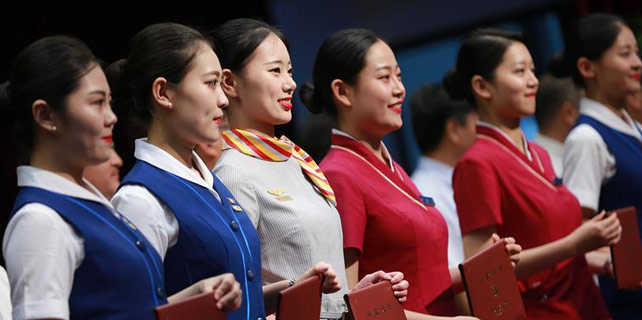Online stars shine as money floods in
 |
|
Internet celebrities hold a live broadcast in Hangzhou, capital of Zhejiang province, ahead of World Sleep Day in March. [Photo provided to China Daily] |
China's internet celebrities are leveraging their popularity among young Chinese followers to make money like never before, creating an industry with real investment value, a new industry report has found.
According to the report published in Shanghai on Friday by iResearch Consulting Group, as of May the ranks of internet celebrities on Sina's Weibo with more than 100,000 followers had increased 57.3 percent from a year ago.
The report also found that the total number of their followers surged 20.6 percent to 465 million year-on-year.
Additionally, it showed that 61.4 percent of the online celebrities' followers were male. That contrasted with data released by China Internet Network Information Center recording a Chinese netizen male to female ratio of 52.4 to 47.6.
The iResearch findings indicated that the mobile internet is penetrating into lower-tier cities, with about 54.1 percent of the followers coming from small cities. In contrast, netizens from first-tier cities were least attracted by online celebrities, making up 18.5 percent of their fans, lagging second-tier cities at 23.1 percent and third-tier cities at 23.5 percent.
The web celebrities followers extended from mainland to Hong Kong, Macao and Taiwan, whose residents accounted for 2.5 percent of the total fan base.
Consultancy iResearch, which provides online audience measurements and consumer data in China, said the report followed extensive analysis on current conditions and prospects for the cyber celebrity related economy.
According to Zou Lei, co-president of iResearch, internet celebrities are creating an industry with real investment value after years of development of the sector.
Through posting words, pictures, voices, video clips and live steaming associated with brands, Zou said online celebrities were turning their fame and influence into real cash.
Daily transaction volumes of e-commerce related directly to online celebrities exceeded 54.7 million yuan ($8.0 million) in the second quarter this year, representing 106 percent year-on-year growth, according to data from Weibo.
The Chinese celebrity value listing, which aims to provide thorough analysis of Chinese cyber influencers, was jointly published on Friday by Weibo, Harper's Bazaar and iResearch. The partners said they believed that by establishing a set criteria for evaluation of the sector, the online celebrity industry could develop in a more healthy and orderly way, and evolve into a complete industry chain.
The listing was compiled with comprehensive data and an index that ranked among other factors, communications skills, interaction with fans, the ability to cash in and influence followers, e-commerce gross merchandise value, online celebrity endorsements and income from fans.
"We have noticed that more than 90 percent of the top 100 online celebrities on Weibo have signed contracts with professional agents, or a multichannel network," said Cao Zenghui, vice-president of Weibo.
Monthly active users of Weibo, a Chinese Twitter-like service, reached 340 million in the first quarter of this year, and daily active users reached 154 million, according to Cao.
The report said it believed that cooperation between internet celebrities and platforms like Weibo would boost profits.
It said that with more capital flowing into the industry, the competition for resources and platforms would become fiercer, requiring more diversified content and presentations to satisfy the demand of followers while fending off rivals.
"The online celebrity economy in China is still in its infancy with huge growth potential," Zou said.
"In the past few years, we have seen internet celebrities offering more diversified, personalized and professional content, with the influence of multichannel networks growing."









